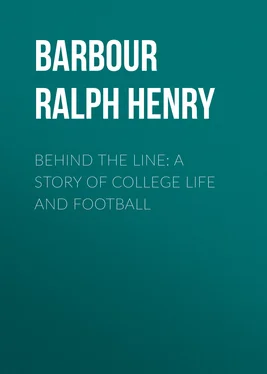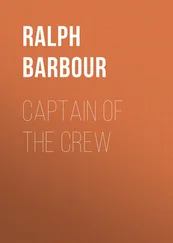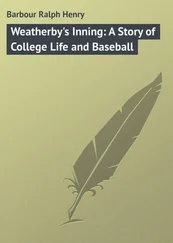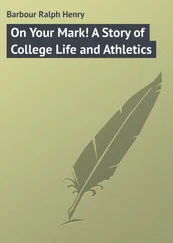Ralph Barbour - Behind the Line - A Story of College Life and Football
Здесь есть возможность читать онлайн «Ralph Barbour - Behind the Line - A Story of College Life and Football» — ознакомительный отрывок электронной книги совершенно бесплатно, а после прочтения отрывка купить полную версию. В некоторых случаях можно слушать аудио, скачать через торрент в формате fb2 и присутствует краткое содержание. Жанр: foreign_children, foreign_antique, foreign_prose, на английском языке. Описание произведения, (предисловие) а так же отзывы посетителей доступны на портале библиотеки ЛибКат.
- Название:Behind the Line: A Story of College Life and Football
- Автор:
- Жанр:
- Год:неизвестен
- ISBN:нет данных
- Рейтинг книги:3 / 5. Голосов: 1
-
Избранное:Добавить в избранное
- Отзывы:
-
Ваша оценка:
- 60
- 1
- 2
- 3
- 4
- 5
Behind the Line: A Story of College Life and Football: краткое содержание, описание и аннотация
Предлагаем к чтению аннотацию, описание, краткое содержание или предисловие (зависит от того, что написал сам автор книги «Behind the Line: A Story of College Life and Football»). Если вы не нашли необходимую информацию о книге — напишите в комментариях, мы постараемся отыскать её.
Behind the Line: A Story of College Life and Football — читать онлайн ознакомительный отрывок
Ниже представлен текст книги, разбитый по страницам. Система сохранения места последней прочитанной страницы, позволяет с удобством читать онлайн бесплатно книгу «Behind the Line: A Story of College Life and Football», без необходимости каждый раз заново искать на чём Вы остановились. Поставьте закладку, и сможете в любой момент перейти на страницу, на которой закончили чтение.
Интервал:
Закладка:
In the middle of the last century, when Erskine was little more than an academy, it was often called "the little green school at Centerport." It is not so little now, but it's greener than ever. Wide-spreading elms grow everywhere; in serried ranks within the college grounds, in smaller detachments throughout the village, in picket lines along the river and out into the country. The grass grows lush wherever it can gain hold, and, not content with having its own way on green and campus, is forever attempting the conquest of path and road. The warm red bricks of the college buildings are well-nigh hidden by ivy, which, too, is an ardent expansionist. And where neither grass nor ivy can subjugate, soft, velvety moss reigns humbly.
In the year 1901, which is the period of this story, the enrolment in all departments at Erskine was close to six hundred students. The freshman class, as had been the case for many years past, was the largest in the history of the college. It numbered 180; but of this number we are at present chiefly interested in only two; and these two, at the moment when this chapter begins–which, to be exact, is eight o'clock of the evening of the twenty-fourth day of September in the year above mentioned–were busily at work in a first-floor study in the boarding-house of Mrs. Curtis on Elm Street.
It were perhaps more truthful to say that one was busily at work and the other was busily advising and directing. Neil Fletcher stood on a small table, which swayed perilously from side to side at his every movement, and drove nails into an already much mutilated wall. Paul Gale sat in a hospitable armchair upholstered in a good imitation of green leather and nodded approval.
"That'll do for 'Old Abe'; now hang The First Snow a bit to the left and underneath."
"The First Snow hasn't any wire on it," complained Neil. "See if you can't find some."
"Wire's all gone," answered Paul. "We'll have to get some more. Where's that list? Oh, here it is. 'Item, picture wire.' I say, what in thunder's this you've got down–'Ring for waistband'?"
"Rug for wash-stand, you idiot! I guess we'll have to quit until we get some more wire, eh? Or we might hang a few of them with boot-laces and neckties?"
"Oh, let's call it off. I'm tired," answered Paul with a grin. "The room begins to look rather decent, doesn't it? We must change that couch, though; put it the other way so the ravelings won't show. And that picture of–"
But just here Neil attempted to step from the table and landed in a heap on the floor, and Paul forgot criticism in joyful applause.
"Oh, noble work! Do it again, old man; I didn't see the take-off!"
But Neil refused, and plumping himself into a wicker rocking-chair that creaked complainingly, rubbed the dust from his hands to his trousers and looked about the study approvingly.
"We're going to be jolly comfy here, Paul," he said. "Mrs. Curtis is going to get a new globe for that fixture over there."
"Then we will be," said Paul. "And if she would only find us a towel-rack that didn't fall into twelve separate pieces like a Chinese puzzle every time a chap put a towel on it we'd be simply reveling in luxury."
"I think I can fix that thing with string," answered Neil. "Or we might buy one of those nickel-plated affairs that you screw into the wall."
"The sort that always dump the towels on to the floor, you mean? Yes, we might. Of course, they're of no practical value judged as towel-racks, but they're terribly ornamental. You know we had one in the bath-room at the beach. Remember? When you got through your bath and groped round for the towel it was always lying on the floor just out of reach."
"Yes, I remember," answered Neil, smiling. "We had rather a good time, didn't we, at Seabright? It was awfully nice of you to ask me down there, Paul; and your folks were mighty good to me. Next summer I want you to come up to New Hampshire and see us for a while. Of course, we can't give you sea bathing, and you won't look like a red Indian when you go home, but we could have a good time just the same."
"Red Indian yourself!" cried Paul. "You're nearly twice as tanned as I am. I don't see how you did it. I was there pretty near all summer and you stayed just three weeks; and look at us! I'm as white as a sheet of paper–"
"Yes, brown paper," interpolated Neil.
"And you have a complexion like a–a football after a hard game."
Neil grinned, then–
"By the way," he said, "did I tell you I'd heard from Crozier?"
"About Billy and the ducks? And Gordon's not going back to Hillton? Yes, you got that at the beach; remember?"
"So I did. 'Old Cro' will be up to his ears in trouble pretty soon, won't he? I'm glad they made him captain, awfully glad. I think he can turn out a team that'll rub it into St. Eustace again just as you did last year."
"Yes; and Gardiner's going to coach again." Paul smiled reminiscently. Then, "By Jove, it does seem funny not to be going back to old Hillton, doesn't it? I suppose after a while a fellow'll get to feeling at home here, but just at present–" He sighed and shook his head.
"Wait until college opens to-morrow and we get to work; we won't have much time to feel much of anything, I guess. Practise is called for four o'clock. I wonder–I wonder if we'll make the team?"
"Why not?" objected Paul. "If I thought I wouldn't I think I'd pitch it all up and–and go to Robinson!" He grinned across at his chum.
"You stay here and you'll get a chance to go at Robinson; that's a heap more satisfactory."
"Well, I'm going to make the varsity, Neil. I've set my heart on that, and what I make up my mind to do I sometimes most always generally do. I'm not troubling, my boy; I'll show them a few tricks about playing half-back that'll open their eyes. You wait and see!"
Neil looked as though he was not quite certain as to that, but said nothing, and Paul went on:
"I wonder what sort of a fellow this Devoe is?"
"Well, I've never seen him, but we know that he's about as good an end as there is in college to-day; and I guess he's bound to be the right sort or they wouldn't have made him captain."
"He's a senior, isn't he?"
"Yes; he's played only two years, and they say he's going into the Yale Law School next year. If he does, of course he'll get on the team there. Well, I hope he'll take pity on two ambitious but unprotected freshmen and–"
There was a knock at the study door and Paul jumped forward and threw it open. A tall youth of twenty-one or twenty-two years of age stood in the doorway.
"I'm looking for Mr. Gale and Mr. Fletcher. Have I hit it right?"
"I'm Gale," answered Paul, "and that's Fletcher. Won't you come in?" The visitor entered.
"My name's Devoe," he explained smilingly. "I'm captain of the football team this year, and as you two fellows are, of course, going to try for the team, I thought we'd better get acquainted." He accepted the squeaky rocking-chair and allowed Paul to take his straw hat. Neil thought he'd ought to shake hands, but as Devoe made no move in that direction he retired to another seat and grinned hospitably instead.
"I've heard of the good work you chaps did for Hillton last year, and I was mighty glad when I learned from Gardiner that you were coming up here."
"You know Gardiner?" asked Neil.
"No, I've never met him, but of course every football man knows who he is. He wrote to me in the spring that you were coming, and rather intimated that if I knew my business I'd keep an eye on you and see that you didn't get lost in the shuffle. So here I am."
"He didn't say anything about having written," pondered Neil.
"Oh, he wouldn't," answered Devoe. "Well, how do you like us as far as you've seen us?"
"We only got here yesterday," replied Paul. "I think it looks like rather a jolly sort of place; awfully pretty, you know, and–er–historic."
Читать дальшеИнтервал:
Закладка:
Похожие книги на «Behind the Line: A Story of College Life and Football»
Представляем Вашему вниманию похожие книги на «Behind the Line: A Story of College Life and Football» списком для выбора. Мы отобрали схожую по названию и смыслу литературу в надежде предоставить читателям больше вариантов отыскать новые, интересные, ещё непрочитанные произведения.
Обсуждение, отзывы о книге «Behind the Line: A Story of College Life and Football» и просто собственные мнения читателей. Оставьте ваши комментарии, напишите, что Вы думаете о произведении, его смысле или главных героях. Укажите что конкретно понравилось, а что нет, и почему Вы так считаете.












